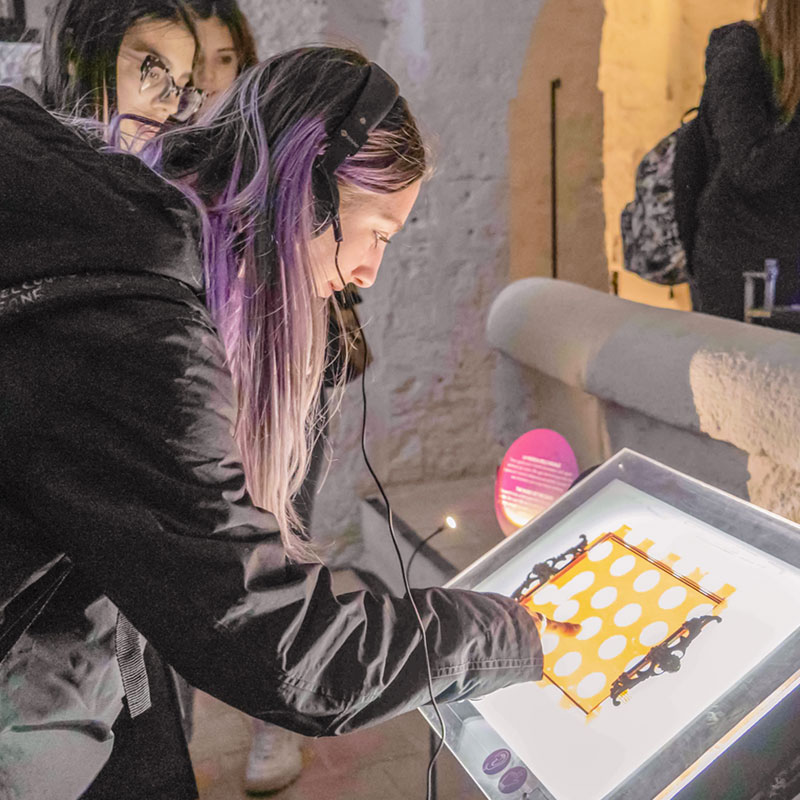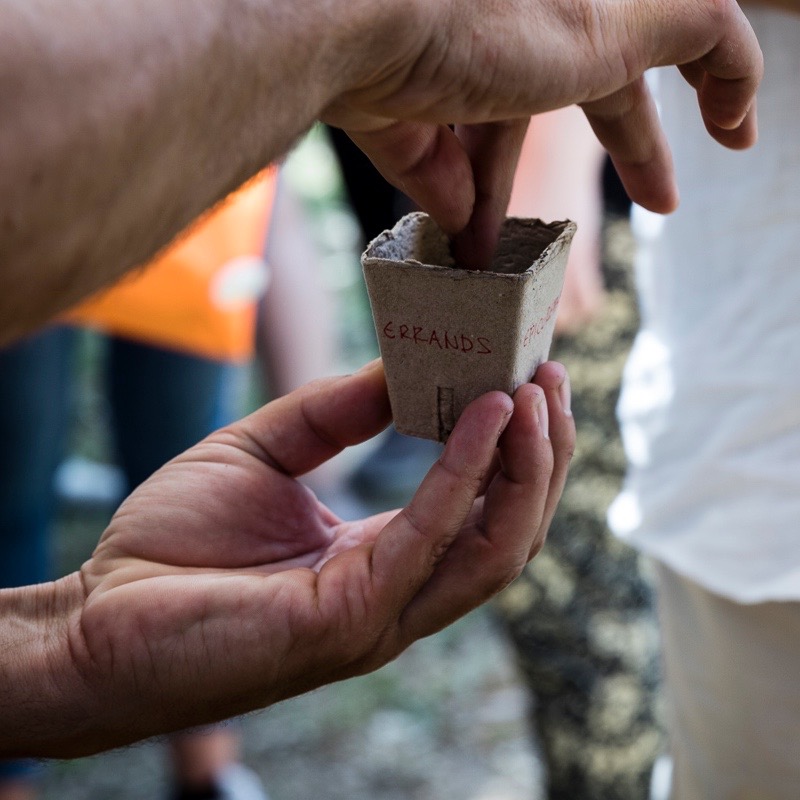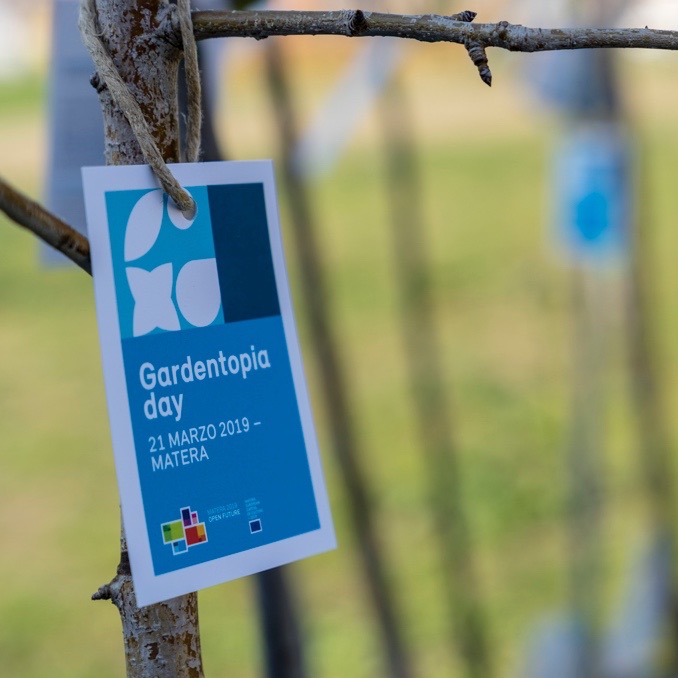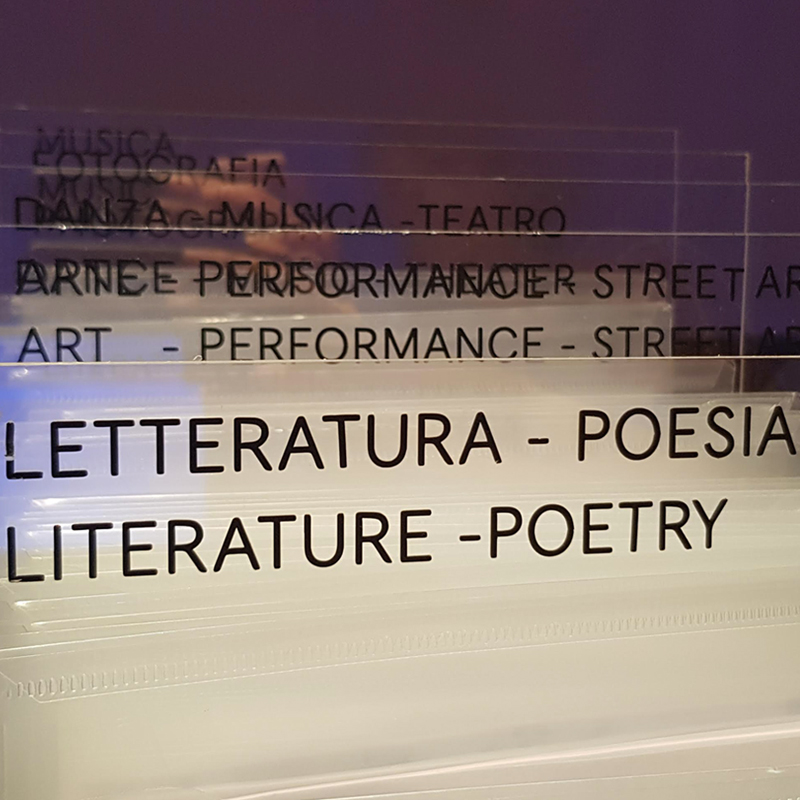Home
The pop museum of small re(f)used objects

After two months, the travelling museum of fragments, traces and small re(f)used objects collected for the M.E.M.O.RI. project, and co-produced by La Luna al Guinzaglio, has closed its doors.
The museum developed out of a journey through Europe and the Mediterranean in search of souvenirs and handmade objects, stopping off in the five port cities of Genoa, Malaga, Marseille, Tetouan and Tunis and within the borders of Lucania in Bernalda, Matera, Muro Lucano, Potenza and Venosa. As the various places were visited, the purpose of the study changed, as did the very sense of souvenirs, leading to a transformation from typical to topical objects.
What are re-fused objects? They may be bottle caps, plane tickets, packaging, pieces of paper or objects found by chance in a pocket or in the street. The Museo Euro-Mediterraneo dell'Oggetto RI-fiutato's collection exhibits object that have not been rejected because of what they are but because they are "sensed again". They are objects we dispose of automatically, and often unreasonably: they are objects that can have a new life.
M.E.M.O.RI. is a pop museum, a popular museum that might be put together by anybody, because it is made up of small things, trivial objects that are a result of chance encounters: fragments of stone, thread and fabric reinterpreted through kaleidoscopes, handles and magnifying glasses.
From 3 May to 7 July, in the setting of the Chiesa Rupestre Santa Maria de Armenis, which reopened its doors after years of being closed so that it could host elements of the Matera 2019 cultural programme, all these objects, reworked as a sign of respect for the memories they carry with them and as a gesture towards saving the planet and ourselves, were on show. The magic of M.E.M.O.RI. lies in telling the story of these discarded objects and encountering them interactively. Visitors are invited to undertake a "manu-mission", using their hands as a way of establishing a direct contact with the found objects and accessing their internal memories.
In the 30 days it was open, M.E.M.O.RI. was visited by some 1,300 temporary citizens from Italy and abroad, above all from schools, universities, associations, foundations and summer camps, involving adults and children, educators, teachers, members of associations and disabled persons.
The collection is divided into an "Anarchivio" and five sections called Stanze, spaces where people are invited to stay, give themselves time, slow down and explore. The Anarchivio is an unusual kind of archive that conserves the memory of the objects on display and the research methods used in the investigation process through a collection of documents and testimonies. The Stanza dei Segni is a room for hands that touch lightly, squeeze and immerse themselves as ambassadors for our bodies, which as they touch, leave a sign or a feeling, and enshrine their movement. The Stanza dei Frammenti is a space of fragility and small things, in which things speak as remnants and details rather than as complete objects. The Stanza delle Cadute is where the humblest of remnants collected from floors while passing through artisans' workshops can be found; it is where things that fall and are lost can talk: shavings, threads, leftovers from a manufacturing process or buttons. In the Stanza delle Ripetizioni, the collection of remnants celebrates cycles, returning, circularity and the forms of materials. The final room, the Stanza delle Chimere, which opened on 27 May, was inspired by artistic elements on the universe of myths suggested by the Japanese artist Kaori Kato. It is a space in which we move towards the future, riding ideas that have their roots in the past – objects, artefacts and tools – where visitors become a part of the same creature, and components of the same structure.
Each room presents a loaned work that is tied to a Spontaneous Museum, a wide-ranging online network of museums opened in various places by citizens, individuals and associations. They are M.E.M.O.RI.’s external sections. Using a real museum protocol as regards their preparation and inauguration, they are opened in other locations by anyone who wants to turn their own private collection into an exhibition, a narration or a place of hospitality: there is one in Potenza in the home of an artist, one in Genoa in a tai chi gym and one at the Liceo Artistico in Matera, and there are others elsewhere in Europe. By using the MemorAbilia app, which was designed especially for the project, more can be discovered about the loaned work, what it was, who has it and its dimension in the Mediterranean area. The app, which can be downloaded on to both Android and iOS smartphones, enriches the use of M.E.M.O.RI. with an audio guide in English and Italian, scientific information, 3D animations and stories in rhyme.
A long series of events and appointments preceded, supplemented and enriched the exhibition dimension of the M.E.M.O.RI. museum, to encourage new reflections on the Mediterranean, relations, languages and art. Guests of the workshops include the founder of the Museo Tolomeo, Fabio Fornasari, the anthropologist and journalist Duccio Canestrini, the fantasiologist Massimo Gerardo Carrese, the photo journalist Antonio Politano, the artists Kaori Kato, Hassan Echair and Farah Khelil, the curator Maria Rosa Sossai, Fabio Bonelli and the author Gianluca Caporaso.
Now that the exhibition in Matera has closed, the M.E.M.O.RI. collection will be on the move again, first to Potenza, then to the Genoa Science Festival, and then on to Bologna, Antwerp and Malaga. Who can tell? I may be enhanced by more objects to re-sense, rework and protect.
Gardentopia Day 2, exploring the heart of Basilicata amongst community gardens

Contemporary art enters the heart of Basilicata with the Gardentopia Day #2 community gardens tour, a large-scale project that promotes green culture and active citizenship thanks to new synergies between citizens and artists.
An opportunity to bring together the citizens who work to manage these urban green spaces and for them to participate in the artistic and social interventions that are created here by artists from all over the world, selected by the curator of the Gardentopia project, Pelin Tan.
Between food, cultivation and philosophy, the day's programme started in Matera, where at 9.00 two buses departed with more than 100 citizens, to start a Gardentopia tour between the municipalities of Basilicata, covering two different routes.The first section included a first morning stop at the Irsina community garden where the public participated in the ‘Community Radio’ artistic intervention with the Radio Instabile performance from the artists Futurefarmers and Maria Pecchioli who worked with the local inhabitants, plants and one another to collectively imagine a new ‘tale of wonder’. The story was transmitted locally via radio and through a series of seed-shaped speakers, migrating from hand to hand throughout the area. The second stage went through the community garden of Campomaggiore where at noon there was a community picnic with music from Pu.Ba.La selectors and made even more tasty by the infusions of the mobile tea house. In parallel, the second section included a first stop at the Metaponto community garden with the Epicurean garden performance from the Greek collective Errands, composed of architects, visual artists and sociologists. The group has created an epicurean garden according to the life models of the Greek philosopher Epicurus. The second stop at the community garden of Stigliano was the site for the community picnic with entertainment from Euroband, La Murgia's street band. At 19.00, all the buses then found themselves in the community garden of Castelsaraceno for the ‘Community Dinner’, accompanied by two different activities: the performance by the Thai artist Rirkrit Tiravanija, known for creating social relations in the artistic spaces and widely recognised as one of the most influential artists in socially engaged art; and a talk by the philosopher Nicola Perullo.
The Thai artist Rirkrit Tiravanija ended Gardentopia Day #2 with a lively cooking performance and installation in the garden, cooking with local and Thai ingredients at the NaturalMensa of Castelsaraceno, an eco-sustainable canteen with an experimental lunch service based on organic products.
Gardentopia Day 1, community gardens tour of Matera

With the beginning of spring the first Gardentopia Day transformed the gardens of Matera into community places. This marks the start of the second phase of a large-scale project that promotes green culture and active citizenship, also thanks to new collaborations between citizens and artists. The sociologist and historian of Turkish art, Pelin Tan, will be in charge of the development of the project during 2019. The first Gardentopia Day opened in the morning with the creation of the new community garden at Casino Padula, home of the Open Design School in Matera, thanks to the involvement of students and teachers from the IC Padre Semeria school, Don Milano campus, Briganti Agricultural Institute and C. Levi School of Arts. The students were the protagonists of the performance of ‘Evolutionary Garden - 100 trees for Gardentopia’ by the artist Luigi Coppola, activist and promoter of public art projects. With this inauguration, planting began of the first of the 100 trees of many varieties of berries destined for the public gardens of the Basilicata network. In the afternoon the trees were handed over to the representatives of the 22 municipalities of Basilicata that joined the project by responding to Matera 2019’s call to all of Basilicata in collaboration with the regional ANCI, namely Bernalda, Stigliano, Salandra, Oliveto Lucano, Campomaggiore, Pietrapertosa, Irsina, Palazzo San Gervasio, Vaglio di Basilicata, Pietragalla, Montemilone, Lavello, Maschito, Barile, Rionero in Vulture, Rapone, Muro Lucano, Vietri di Potenza, Sasso di Castalda, Chiaromonte, San Costantino Albanese, Castelsaraceno, as well as Matera and Potenza. Planting these trees in community gardens was a symbolic act to start a network across the region facilitated by the presence of artists who will use art as a tool to engage the community. The ‘Evolutionary Garden’ project illustrated by the artist Coppola works on the theme of biodiversity overcoming the idea of monoculture just as thanks to agriculture, plants that have arrived from the most diverse places have become plants that we today consider as ours, having accepted them and integrated them into our territory. A rickshaw and electric bike tour amongst the three community gardens of the city of Matera, each featuring entertainment for the public, livened up the afternoon of Gardentopia Day 1. The Garden of Moments in the Lanera district, managed by the MOM Association - Materan Mothers at Work, hosted the magic show by the Association ‘Lacaposciuc ASD’. At Agoragri there was food design with Cozinha Nomade while in Pascoli, in the Spighe Bianche garden on Via Lazzazzera, there was a performance from the Cantori Materani conducted by Alessandra Barbaro. The tour ended with a return to Casino Padula to participate in a Contini performance and spend the first spring evening with a DJ set.
Coldiretti donated the hundred trees, the hundred bales of hay that marked out the space of the great outdoor amphitheatre of Casino Padula and also the fruit that was given to the participants. ‘Evolutionary Garden’ is a participatory project that wants to create, with an extensive network of collective gardens, an open vision of the practice of plant reproduction, trying to escape the logic of domination of nature, uniformity, monoculture and embracing interspecies hybridisation, fusion, circulation and complexity.
Matera - Japan: cultural exchange between Lucanian and Japanese artists

Do you work in the art or culture environment and live in Basilicata? Would you like to host a Japanese artist in 2019 who will offer you hospitality in Japan in 2020?
The aim of the Passport Program is to launch a two-year reciprocal cultural exchange program for Italian and Japanese artists, to foster an exchange of ideas and knowledge and develop strong and lasting bonds between Lucanian and Japanese artists.
In 2019 Lucanian artists and professionals will host a Japanese artist or citizen resident in Japan, while in 2020 Japanese artists and professionals will return the hospitality to Lucanian artists by hosting them in Japan. The Program is managed in partnership by Matera 2019 and EU-Japan Fest, a Japanese non-governmental organisation whose mission is to support cultural contacts of all kinds through the European Capitals of Culture.
The call is open to artists and professionals in the cultural sector who are resident in Basilicata and work in any artistic domain (including arts and crafts, design, graphic work and architecture).
To take part and host a Japanese artist please read the application information carefully and fill in the registration form you will find in the dedicated section under Transparent Administration. The completed form then needs to be sent to the following email address: This email address is being protected from spambots. You need JavaScript enabled to view it..
Lucanian artists or professionals will be responsible for the Japanese artist’s food and accommodation expenses for the entire duration of their stay in Italy (i.e. from a minimum of 5 to a maximum of 10 days, excluding days for travelling to and from Japan). Matera 2019 will contribute a share up to €20 per diem for each artist hosted, up to a maximum of €200. To find out more, see the application information. The deadline for applications is 31 October 2019.





